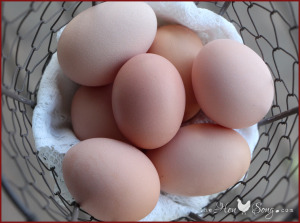In posting a photo of my new egg skelter on my Facebook page, I was surprised at how many folks asked me, “You don’t keep your eggs in the refrigerator?” No, I don’t. My eggs are not washed and therefore do not need to be kept in the fridge.
Now you might get differing opinions from others, and to each his own. But these are my thoughts…
Mother Nature has thought of everything in creating the farm fresh egg. Not only is the egg a beauty to behold, but also very practical. The last stage in creating an egg—just before it is laid—involves adding the “bloom”, which is a protective coating over the outer shell. This wet coating quickly dries as soon as the hen lays the egg. It protects the contents from harmful bacteria getting inside. Think about if the egg was fertile and mama was sitting on a clutch of them for 21 days. Mother Nature has provided a safe place for the developing baby inside that cute egg.
In Europe, you won’t find eggs in the refrigerated section of the market. They have not been washed. When you get an unwashed egg, you know what kind of condition the nesting boxes are in. Occasionally, even the cleanest of boxes will get a muddy foot in there which can dirty the egg a bit. But, for the most part, farm fresh eggs are clean because the hens live in clean conditions. Do you think all the eggs in U.S. supermarkets come from clean conditions? If they did, they wouldn’t need to administer so many antibiotics. But, we’ll save that for another blog entry…
So, enjoy those unwashed, healthy eggs! And if you’re looking for a nice way to display them, I can recommend an egg skelter. Just love mine!
Some more little egg-bits:
 Did you know the egg travels pointy end first, and at the last minute (just before being laid) turns 180 degrees so the fat end comes out first? Also, hens will sit in the box as the egg gets ready to be laid. Just before she’s ready to lay the hen will stand up a bit, and viola, out comes an egg—fat end down—in the nesting box!
Did you know the egg travels pointy end first, and at the last minute (just before being laid) turns 180 degrees so the fat end comes out first? Also, hens will sit in the box as the egg gets ready to be laid. Just before she’s ready to lay the hen will stand up a bit, and viola, out comes an egg—fat end down—in the nesting box!
Do you know how to tell how old an egg is? Do the water test: Put an egg in a glass of cold water. Does it float? Or sink? If it sinks all the way down and lays flat, it’s very fresh. The more it floats the older it is. Here’s why: Eggshells are porous, and over time air will seep in at the fat part of the egg. That air is what the baby chick—if the egg was fertile and had a developing baby in it—would first breathe. Ever notice when you hard boil an egg and the fat end has a dent in it? Yup, it’s an air pocket. The bigger the pocket, the older the egg.
Pretty neat-o, eh? I think so. But then I could talk “chicken” all day long!
